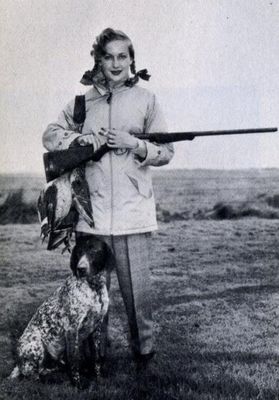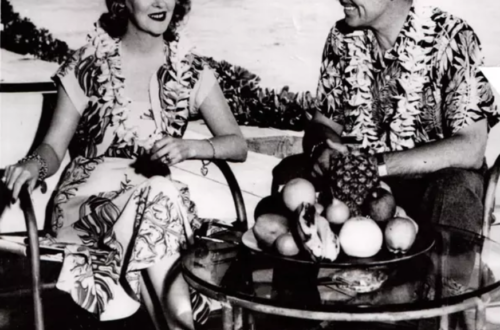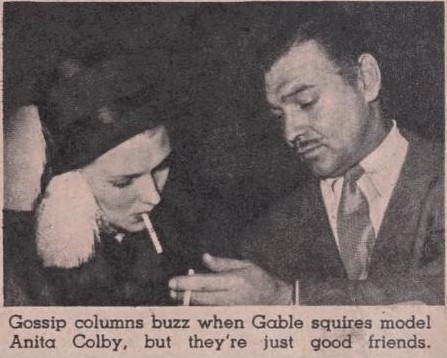{New Article} 1957: I Call on Clark Gable
Folks, as far as articles go on Clark Gable, this one is a gold mine! If you’ve perused through our Article Archive here, you know that many interviews with Clark are pure fluff. MGM protected what was published about its stars and Clark was no exception. Most interviews never asked the questions people really wanted to know, and instead of a true sit-down interview, it was a quick conversation (if any at all) that was beefed up by the writer’s own assumptions and fluffy writing.
This one is different. Of course by this time, it was the late 50’s and the “studio system” had dissapated. Clark was no longer under MGM’s protective wing, having been freelance a few years. And by this time, interviews and magazine articles were more like they were today, straight forward and informational, rather than sappy and full of sugar-coated glossiness.
According to this article, Clark had considered hiring the author to help him write his autobiography, an idea I never thought Clark ever considered. Well, Clark did scrap that idea but agreed to a personal interview. Clark sat in a hotel room with this writer and his tape recorder and answered what he asked. Kay comes in the room too and their banter is also recorded. Unlike most interviews where you can read through what the writer claims Clark “said”, you can tell these are Clark’s words and he doesn’t mince them. I could pick through the whole article piece by piece and discuss it for hours but here are some highlights:
I said, “There’s a legend that the classic touches in that film—the piggyback scene, the passengers singing ‘The Daring Young Man on the Flying Trapeze’ in the bus, Claudette Colbert thumbing a ride by lifting her skirt and adjusting her garter while passing motorists slammed on their screaming brakes—were thought up by Capra on the spur of the moment as he went along. Were they in the script,” I asked, “or were they shot off the cuff?”
“They were in the script,” Gable said. “Frank and Bob Riskin put them in. Frank was the director; Riskin was the writer. They were an unbeatable team.”
He didn’t mention another unbeatable team, the stars of the picture. Claudette Colbert and he himself won Academy Awards for the year’s best performance by an actress and actor. Gable isn’t a great one for talking in terms of awards he’s won. The picture itself won the award as the outstanding production of 1934. Capra won an Oscar for his direction. Riskin won a similar award for the year’s best screenplay.
I mentioned another legend that grew out of that film; that he had sabotaged the undershirt industry by peeling off his shirt in the picture and revealing nothing under his shirt but him.
“I didn’t know what I was doing to the undershirt people,” he told me. “That was just the way I lived. I hadn’t worn an undershirt since I’d started to school. They made me feel hemmed in and smothered. I still felt that way when I joined the Air Force in World War Two and I had to put on a t-shirt. I felt swathed in fabric, like a mummy.”
I found that interesting as the story usually told is that they decided to eliminate the undershirt from the scene because it was hard for Clark to continue his dialogue while pulling a shirt over his head.
“I’ve seen Gone with the Wind three times,” I told him, “and I had the feeling you enjoyed it.”
“It was a challenge,” he said, “I enjoyed it from that point of view. But my chin was out to there. I knew what people expected of me and suppose I didn’t produce?”
“But you did produce,” I said.
“Maybe so,” he said noncommittally.
“When did you finally get it through your head you’d done all right?”
He said, “The night we opened in Atlanta, I said, ‘I guess this movie is in.’”
“How did you figure that?” I asked. “Did you enjoy it yourself or did you gauge it by other people’s reactions?”
“Other people’s reactions,” he told me.
On a common myth about himself:
“I think the first time I saw you on the screen was as the chauffeur in Red-Headed Woman,” I said.
“I played a chauffeur in Night Nurse, with Barbara Stanwyck,” Gable told me. “You must have seen me in that. I wasn’t in Red-Headed Woman.”
“Anyhow, it was before you had your ears pinned back,” I said.
“Speaking of myths, that’s one,” [Gable] said. “They were never pinned back.”
I looked at him and said, “They certainly don’t stand out anymore. What happened?”
“He weighed only a hundred and fifty pounds then,” Kay Gable explained. “When you’re that slim your ears can look like handles.”
“I thought maybe he’d had a small operation,” I said.
“No,” Kay told me. “Look behind his ears. No scar tissue!”
On Carole Lombard:
“You may not like my next question,” I said. “Is it true that you don’t like to talk about Carole Lombard because it reminds you of her tragic end and distresses you?”
“That isn’t true,” he said. “My feelings are under better control than that. I have great respect for Carole and the place she had in my life. I want to keep that to myself. It’s not to be kicked around. I’m the one who can control it.”
“I don’t see how you control it unless you talk about it,” I said.
“That’s how I do it,” he said. “By not talking about it.”
That may not seem much of a comment, but I don’t think I have ever heard Clark even remotely discuss Carole in any fashion in the 1950’s, so I was surprised he said anything at all.
I think Carole was one of the main reasons he decided not to write an autobiography, as he told the would-be author:
“I don’t feel I could do an honest job for you if I leave out some of the emotions I’ve had and some of the things that have happened to me, and there are things I don’t care to have the public know. They’re extremely personal. They belong to me.”
There is so much more to this article: Clark’s feelings on television, his hesitation on playing in Mutiny on the Bounty, the details of his 1937 court case, his description of his first screentest–much more! Read this in-depth article in its entirety in the Article Archive.




2 Comments
Debbie
How wonderful! I can’t wait to read the whole article. Thank you!
Ginger
Thanks for posting this article. It confirms for me that Mr. Gable was a private person and did not like to talk about himself or his accomplishments. I loved how he warned Kay that there was a tape recorder in the room when she entered. While an autobiography would have been nice, I don’t think he would have felt comfortable revealing that much of himself to the public and I’m not surprised that he scrapped the idea. My take is that he probably thought an autobiography would be bragging or drawing unnecessary attention to himself. I think he revealed much about his nature with this quote in the article, “The truth is people are no trouble as far as I’m concerned. I respect them and I hope they respect me.”